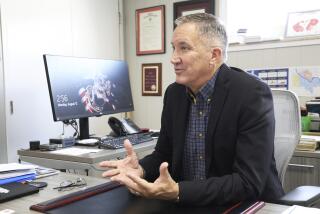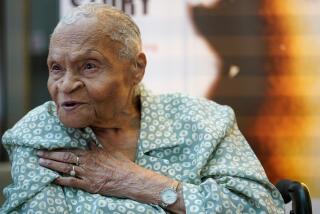A Testimony of Grief, Anger in Oklahoma City
- Share via
OKLAHOMA CITY — They came to court carrying pictures of their dead, more than 100 of them braving zero temperatures and crowding before dawn Tuesday into the federal courthouse, determined in their unity to show a judge that Oklahoma citizens should decide the Oklahoma bombing case.
Doris Jones clutched a studio portrait of her daughter, Carrie Lenz, a federal drug agency employee who was six months’ pregnant when the bombing of the Alfred P. Murrah Federal Building took her life on April 19.
“Her picture goes with me everywhere I go,” her mother said. “I have another one in the car. She never leaves my sight.”
Glenn Seidl wore a baseball cap with six gold stars for the six Secret Service employees killed in the building, including his wife, Kathy.
Tuesday marked the beginning of a pivotal series of hearings to decide where Timothy J. McVeigh and Terry L. Nichols should be tried in the bombing, which killed 169 people and injured 600.
Prosecutors insist that there can be a fair trial in this state in either Lawton or Tulsa. Defense attorneys, alarmed at the deep currents of loss and hatred that still roil this community, suggest Albuquerque, Denver or Kansas City, Kan., as more impartial sites.
Presiding U.S. District Judge Richard Matsch of Denver, assigned to hear the case, has indicated that he will decide soon where the trial will go.
“Obviously it’s a matter of importance to a lot of people, so I’ll try to do it promptly,” the judge said when he arrived Monday at the Oklahoma City airport.
Regardless of where the trial is gaveled to order, it will bring with it grave repercussions for the nation.
No trial of its kind with so many victims has ever been played out anywhere in the country. The bombing was the worst terrorist attack ever on U.S. soil, and where and how the trial is conducted could very well set precedents on how similarly devastating cases are handled.
In addition, as prosecutors argue and much of the court testimony bore out Tuesday, polls of potential jurors show that feelings of anger and retribution run high against the defendants. And Oklahoma is not alone in its anger and outrage.
“New Yorkers are off the charts,” testified Donald E. Vinson, a trial consultant from Los Angeles. “They were particularly angry about this.”
Argued U.S. Atty. Pat Ryan: “The defense has not, cannot and will not prove that the state of Oklahoma does not have 12 jurors and six alternates who can fairly and impartially hear this case. Our evidence will satisfy the court that a fair trial can be held in Oklahoma.”
Ryan and his prosecution team also demand a state trial because so many of the hundreds of victims and relatives cannot afford to travel far to attend a proceeding out of state. Attending the trial is their right, Ryan said, “and we want to accommodate that right as much as possible.”
But defense attorneys said that the Oklahoma community has been subjected to such trauma that residents throughout the state would be unable to fairly judge McVeigh and Nichols.
To demonstrate their point, defense lawyers showed the judge 45 minutes of highlights from local television reports dealing with the bombing, the arrests of McVeigh and Nichols and the deep hatred that has risen from the tragedy.
The anger here indeed does run deep.
Edye Smith, the mother of two young boys killed in the Murrah building’s day care center, came to the courthouse to set eyes on McVeigh and Nichols. Afterward, she said that, while her Christian heart allows forgiveness, she believes the two are guilty.
“They’re on a one-way train straight to hell,” she said.
More to Read
Sign up for Essential California
The most important California stories and recommendations in your inbox every morning.
You may occasionally receive promotional content from the Los Angeles Times.











